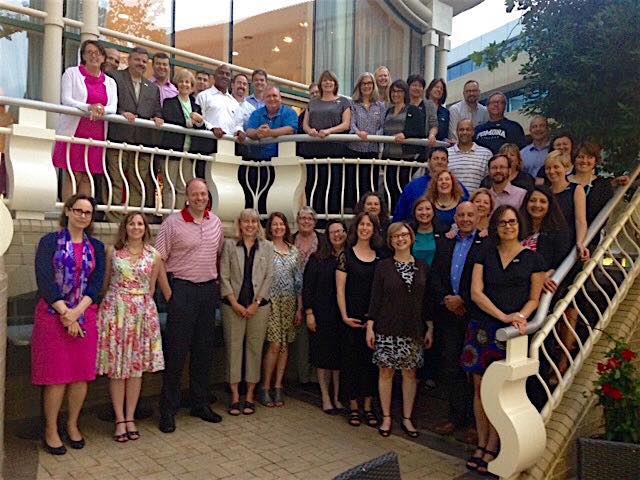By Donna Ziegenfuss
I recently attended the 2016 Leading Change Institute (LCI), a program sponsored through CLIR and EDUCAUSE, with 37 amazing and talented higher education IT and library professionals. I wasn’t really sure what to expect, but I was excited and honored to be there. The week-long experience included presentations by diverse and inspiring guest speakers from across higher education, engaging team work, challenging projects, and extraordinary discussions. Elliott Shore and Joanne Kossuth deserve special thanks for their wisdom, patience, and encouragement, and for designing this incredible experience. I walked away with a cadre of new friends, colleagues, and mentors; new lenses for viewing higher education’s wicked problems; and a humbling awareness of and appreciation for the complexity inherent in higher education leadership today. One concept that especially resonated with me was the idea of casting a wider net, which continually resurfaced in our presentations, discussions, and reflections. For example, in a Q&A with the president and provost of Smith College, they discussed how when you feel you don’t have all of the information to make a decision or solve a problem, you should cast a wider net so that you get a truer picture of the full situation. This concept also resonated with my LCI peers, who in our post-LCI online discussions have been talking about making this phrase our 2016 LCI cohort motto.
As a librarian, I have always thought I was good at reaching out to partners and collaborating across campus. In addition, as a former faculty developer, I had also established many campus partnerships and demonstrated my ability to work across disciplinary divides before switching gears to join the library faculty. That is like casting a wider net, right? The LCI context took my thinking about my work as a librarian to a whole new level. By reflecting on this phrase all week, and as I continue to reflect on it now that I am back at my institution, I can see new ways to improve my net-casting skills. I can be more action-oriented, more deliberate, and more strategic. Where should I focus on casting my wider net? How far should I cast it? Should I take more risks? Could an even wider net have even wider impacts? What nets can we cast that include both libraries and IT? Who else can I empower to cast a wider net? I am not sure how to answer all of these questions, but thinking about them has helped me hone my strategy for becoming a more transparent, inclusive, and strategic net caster. Each day, I cross disciplinary boundaries as I assist and mentor students and faculty working on different research projects, but I can lose sight of the importance of how and when to cross boundaries and cast nets. After completing the StrengthsFinder assessment, I discovered my net-casting strengths and now feel more empowered to stretch beyond my comfort zone.
As a recent interim department head in the middle management trenches of an administrative reorganization, I was comfortably operating in my own silo. I routinely go deep within my own unit to draw out expertise, gather perspectives, and try to build consensus on a variety of projects. Now in retrospect I can see how casting the net only vertically was a problem. I now see the value in casting the net laterally in the beginning of the brainstorming process to engage more diverse opinions and perspectives before going deeper to draw on my department’s expertise. Casting a wider net can also be a transparent way to invite all to participate in bigger and broader issues. Thanks to my LCI experience, I have more than 40 new places to cast my net when trying to think outside of my university box.
Through this experience, I have also learned that thoughtful and varied strategies are essential when casting of a wide net. Use nets to uncover synergies and make connections between units. Break down or span boundaries that are limiting ideas, resources, and progress by casting a net across silos. As the 2016 LCI cohort moves forward, we will use technology to facilitate communication, collaboration, and social interaction among our group. Within a week of leaving Washington DC, we were interacting online, sharing resources, and challenging and encouraging each other to step up based on our LCI experiences.

This blog is my first step. I plan to take my reflection to a higher level and begin a librarian blog about my lessons learned and the challenges inherent in crossing or breaking down barriers and spanning boundaries. I plan to develop a research agenda on working more transparently across this new emerging higher education context…any interested collaborators? Since I am stepping down soon from a middle management position, I will have an opportunity to focus on net-casting strategies from a grassroots leadership perspective for librarianship and IT, as well as for interdisciplinary teaching, research, and service in higher education. As a member of the 2016 LCI cohort, I challenge you to think about your role as a net caster! I am sure I can speak for our 2016 LCI cohort and say we would love to hear what strategies you are using to cast a wider net at your institution.
Donna Harp Ziegenfuss is associate librarian and interim head of graduate and undergraduate services at the University of Utah’s J. Willard Marriott Library.

